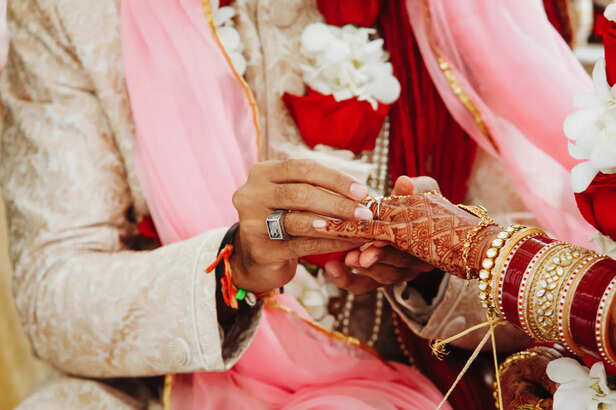Why Indians Are Now Saying No to Marriage and Yes to Peace
Riya Kumari | Jun 05, 2025, 18:29 IST
Indian wedding
( Image credit : Freepik )
Once upon a time in the land of Bollywood dreams, spicy shaadis, and “log kya kahenge” pressure cookers, marriage was the milestone. The ultimate adulting badge. A Big Fat Indian Wedding™ that involved more outfit changes than a Broadway musical and guest lists that included your dad’s barber’s nephew. But somewhere between “rishta pakka” and “ek chutki sindoor,” something quietly shifted. We, the Gen Disenchanted, looked around at the chaos of coupledom, sipped our overpriced iced coffee, and collectively said:“Thanks, but no thanks.”
There was a time when marriage in India wasn’t a personal decision—it was a rite of passage. A box to tick. A social contract wrapped in gold embroidery and approved by distant uncles and nosy neighbours. You did it not because you were ready, but because it was time. But that time is fading. Today, more and more Indians are pausing before they say “I do.” Many aren’t saying it at all. Not out of rebellion, not out of fear—but from something far deeper: clarity. They’ve begun to understand that a wedding isn’t the beginning of a life. Sometimes, it’s the end of the one you actually wanted. And in that understanding, something powerful is happening.
1. We’ve Redefined What Fulfilment Looks Like

Once, fulfilment meant family. Now, it means freedom. Not because we’ve stopped valuing love or companionship. But because we’ve stopped confusing them with marriage. People are finally asking: Will this make me more of myself—or less? Will it nourish me—or slowly erase me in the name of tradition, compromise, and duty? That one question has changed everything.
2. The Peace We Crave Can’t Be Outsourced Anymore

For years, we were told marriage would fix us. That it would solve loneliness. Bring purpose. Offer direction. But many saw the truth early—watching their parents, siblings, friends. They saw how silence lingered between couples who had everything except each other. How sacrifice often meant losing your voice to maintain someone else’s comfort. So now, we’re choosing peace that doesn’t need permission. The kind that isn’t dependent on someone staying.
3. Choosing Not to Marry Is Not a Rejection of Love—It’s a Reclamation of Self

This isn’t about hating weddings or running from commitment. It’s about refusing to shrink. Refusing to become smaller just to fit into a role society has decided for you. Refusing to carry traditions that feel more like chains than roots. For many Indians today, saying no to marriage isn’t bitter. It’s brave. It’s saying: I matter, even if I never wear a mangalsutra or touch someone’s feet.
4. We’re Tired of Calling Pain “Adjustment”

Too many people—especially women—were told their suffering was strength. Told to stay silent for the sake of stability. Told to make it work, no matter the cost. But now, silence is being replaced with questioning. Why is it always the woman who adjusts? Why is emotional labour so invisible until someone stops doing it? We are no longer dressing up endurance as virtue. We are learning to name what hurts, and walk away before it destroys us.
5. Love, Today, Doesn’t Look Like Ownership. It Looks Like Space

In today’s India, love has evolved. It’s not about merging lives until you lose your name. It’s about two whole people choosing each other, without the pressure to become one unit under one roof. Sometimes, the deepest love is knowing when not to entangle. Knowing that a bond without legal strings or social pressures can still be sacred—maybe even more so, because it’s free.
6. We’ve Learned That Legacy Is Bigger Than Bloodlines

For generations, marriage was about legacy. Family trees. Children. Continuity. But now, people are choosing other ways to leave something behind: A book. A business. A changed mind. Kindness that outlives you. A life lived awake. Because legacy is not who carries your surname. It’s how deeply you lived in your truth.
7. Marriage Isn’t Dead. It’s Just No Longer Sacred by Default

We’re not abandoning marriage. We’re just stripping it of the pedestal. It’s no longer the only way to live a full life. It’s a choice—like starting a company, moving to another city, or shaving your head on a Tuesday. Some will still choose it. But now, they’ll do it with their eyes open. Not because they’re told to, but because it genuinely aligns with the life they want. And that choice? That’s what makes it sacred.
FINAL THOUGHT:
We are a generation that watched fairy tales fall apart in real time. We saw how loud love could be, and how quietly it could fade. We saw that “happily ever after” often meant quiet resentment, buried dreams, and smiling for family photos while feeling utterly alone. So we’ve chosen differently. Not because we gave up on love. But because we finally understand that love is not proven by vows, rituals, or rings.
It is proven by peace. By presence. By living without pretending. And if that means choosing a quiet, single life over a loud, crowded one where you disappear a little every day—then maybe that’s not loneliness. Maybe that’s wisdom.
1. We’ve Redefined What Fulfilment Looks Like

Freedom
( Image credit : Pexels )
Once, fulfilment meant family. Now, it means freedom. Not because we’ve stopped valuing love or companionship. But because we’ve stopped confusing them with marriage. People are finally asking: Will this make me more of myself—or less? Will it nourish me—or slowly erase me in the name of tradition, compromise, and duty? That one question has changed everything.
2. The Peace We Crave Can’t Be Outsourced Anymore

Calm
( Image credit : Pexels )
For years, we were told marriage would fix us. That it would solve loneliness. Bring purpose. Offer direction. But many saw the truth early—watching their parents, siblings, friends. They saw how silence lingered between couples who had everything except each other. How sacrifice often meant losing your voice to maintain someone else’s comfort. So now, we’re choosing peace that doesn’t need permission. The kind that isn’t dependent on someone staying.
3. Choosing Not to Marry Is Not a Rejection of Love—It’s a Reclamation of Self

Girls party
( Image credit : Pexels )
This isn’t about hating weddings or running from commitment. It’s about refusing to shrink. Refusing to become smaller just to fit into a role society has decided for you. Refusing to carry traditions that feel more like chains than roots. For many Indians today, saying no to marriage isn’t bitter. It’s brave. It’s saying: I matter, even if I never wear a mangalsutra or touch someone’s feet.
4. We’re Tired of Calling Pain “Adjustment”

Couple fight
( Image credit : Pexels )
Too many people—especially women—were told their suffering was strength. Told to stay silent for the sake of stability. Told to make it work, no matter the cost. But now, silence is being replaced with questioning. Why is it always the woman who adjusts? Why is emotional labour so invisible until someone stops doing it? We are no longer dressing up endurance as virtue. We are learning to name what hurts, and walk away before it destroys us.
5. Love, Today, Doesn’t Look Like Ownership. It Looks Like Space

Working Couple
( Image credit : Pexels )
In today’s India, love has evolved. It’s not about merging lives until you lose your name. It’s about two whole people choosing each other, without the pressure to become one unit under one roof. Sometimes, the deepest love is knowing when not to entangle. Knowing that a bond without legal strings or social pressures can still be sacred—maybe even more so, because it’s free.
6. We’ve Learned That Legacy Is Bigger Than Bloodlines

Wedding
( Image credit : Pexels )
For generations, marriage was about legacy. Family trees. Children. Continuity. But now, people are choosing other ways to leave something behind: A book. A business. A changed mind. Kindness that outlives you. A life lived awake. Because legacy is not who carries your surname. It’s how deeply you lived in your truth.
7. Marriage Isn’t Dead. It’s Just No Longer Sacred by Default

Solo trip
( Image credit : Pexels )
We’re not abandoning marriage. We’re just stripping it of the pedestal. It’s no longer the only way to live a full life. It’s a choice—like starting a company, moving to another city, or shaving your head on a Tuesday. Some will still choose it. But now, they’ll do it with their eyes open. Not because they’re told to, but because it genuinely aligns with the life they want. And that choice? That’s what makes it sacred.
FINAL THOUGHT:
It is proven by peace. By presence. By living without pretending. And if that means choosing a quiet, single life over a loud, crowded one where you disappear a little every day—then maybe that’s not loneliness. Maybe that’s wisdom.
